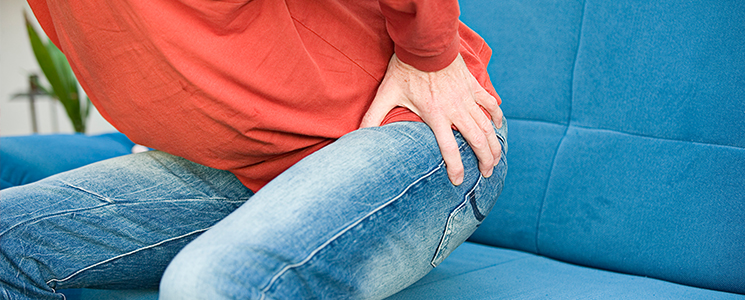Hip Pain Causes, Diagnosis, & Treatment in New Haven

Common causes of hip pain
Hip joint pain can be caused by a number of different conditions, including degenerative diseases, hip injuries, pinched nerves, and birth defects. Hip pain can range from mild in some cases, and in other cases can be debilitating and require hip surgery. Some of the common conditions that can cause hip pain include the following:
Hip Arthritis
Hip pain is often associated with a degenerative joint disease called hip arthritis. Hip arthritis is defined as inflammation in the hip joint caused by deterioration of cartilage in the hip joint over time. When the cartilage is worn down, it can lead to bone-on-bone rubbing, which results in pain, stiffness, and swelling in the hip. Often, the disease develops later in life and can continue to worsen over time without proper treatment.
Hip Fractures
In addition, hip fractures are another source of hip pain that can cause debilitating discomfort and may require surgery. Hip fractures are often the result of a traumatic injury, such as falling from a height or being involved in a motor vehicle accident. As your body ages, your bones often become more fragile and susceptible to fractures, making hip fractures more common as you get older.
In addition, hip joint pain may also be caused by:
- Hip pointer injuries
- Hip sprain
- Enthesopathy of hip (including trochanteric bursitis)
- Failed joint replacement
To learn more about the hip pain causes treated by Dr. Rubin, click on the following buttons.
When should I visit a doctor for hip pain symptoms?
If you are suffering from any of the below symptoms of hip arthritis or hip fracture, you should seek advice from an orthopedic hip specialist, such as Dr. Lee Rubin:
- Severe pain in hip or groin area
- Pain after standing for long periods
- Inability to walk or climb stairs
- Immobility or lowered range of motion in hip
- Stiffness, swelling, tenderness, or discoloration around the hip joint
- Difference in leg lengths
- Inability to put weight on hip joint
- Joint stiffness when waking up in the morning or after sitting
- “Crunching” sound or feeling in hip joint
What are the risk factors for hip joint pain?
While anyone can experience hip pain for a number of reasons, there are certain factors that may increase your chances of suffering from hip pain due to arthritis or hip fracture. You may have a higher risk of suffering from hip pain if you:
- Are older in age
- Have family members with hip arthritis
- Have suffered a hip injury or trauma
- Are female
- Are overweight or obese
- Have undergone hip surgery in the past
How is chronic hip pain diagnosed?
If you are suffering from chronic or severe hip pain, visiting an orthopedic specialist can help you determine the underlying condition causing your pain. While there is no specific test for hip pain, your doctor may conduct one or more imaging tests, including x-ray or magnetic resonance imaging (MRI), combined with a thorough physical examination to determine the cause of your pain.
How to treat hip pain
Depending on the cause and severity of your hip pain, your doctor may recommend one or more of the following conservative treatment options for hip pain:
- Rest
- Anti-inflammatory medications
- Physical therapy
- Hip injections
Surgical treatment options
If conservative hip pain treatments are not effective at relieving your pain, you may be a good candidate for hip surgery. The following hip surgeries are performed by Dr. Rubin, a board-certified orthopedic surgeon who specializes in minimally invasive hip surgery to improve hip function and reduce pain:
- Total hip replacement
- Direct anterior approach total hip replacement
- Partial hip replacement
- Revision hip replacement
Relieve Your hip pain today!
If you’re suffering from hip pain, the first step to feeling better is scheduling an evaluation with Dr. Lee Rubin, an expert in joint replacement surgery. To request an appointment, call (203) 785-2579 or fill out the form on this page.